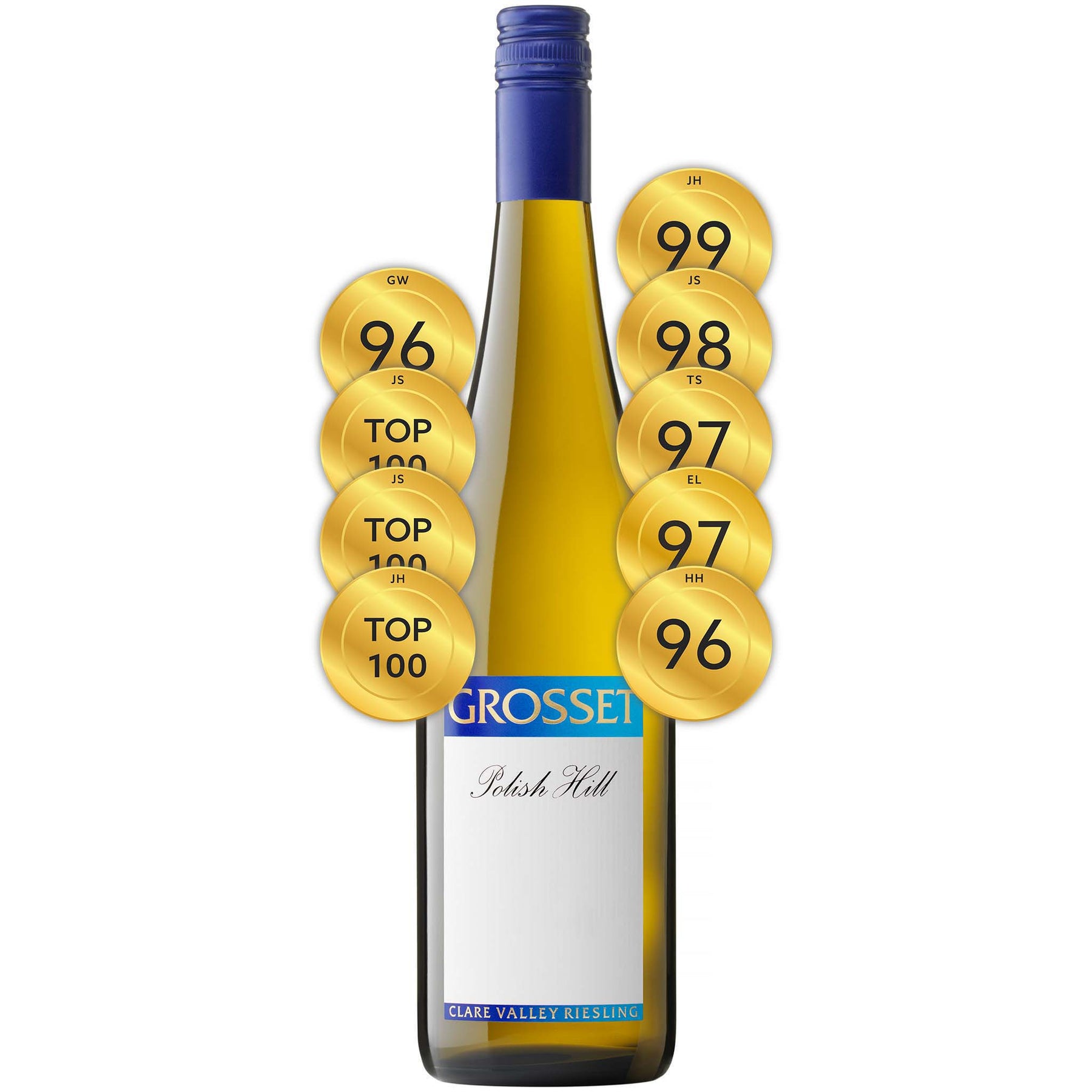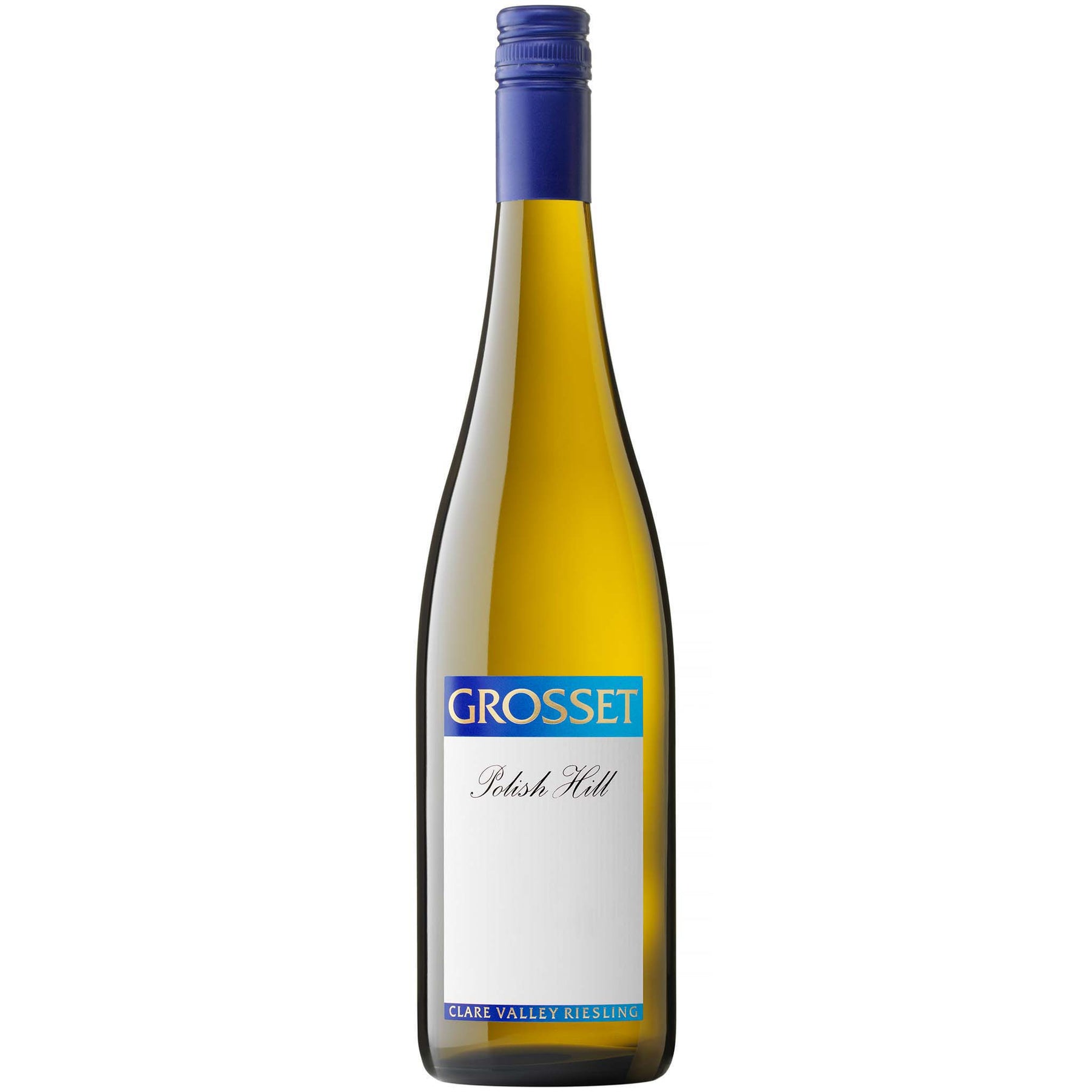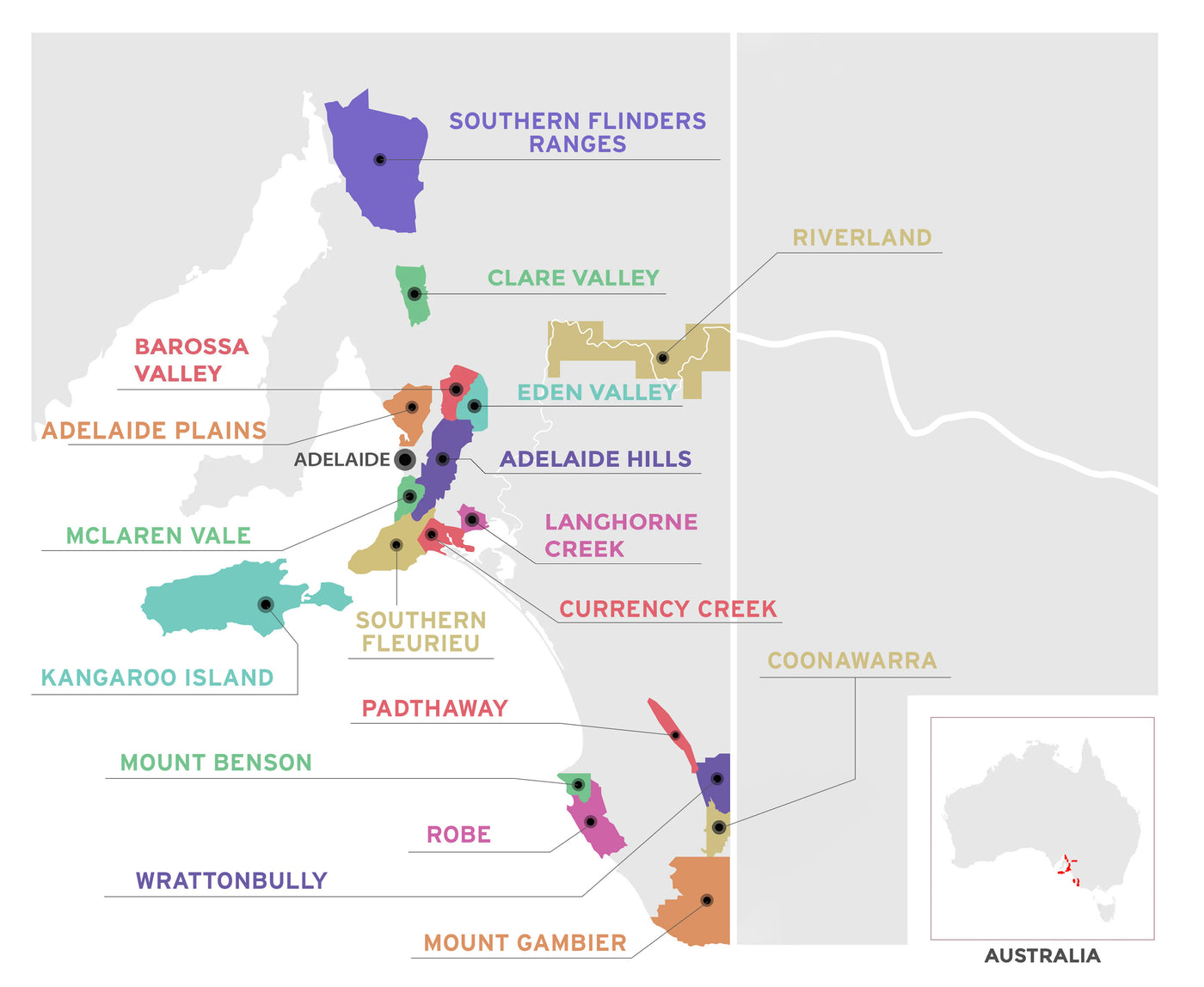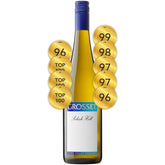

Grosset Polish Hill Riesling 2022
Style: White Wine
Variety: Riesling
Closure: Screwcap
Grosset Polish Hill Riesling 2022
Warehouse
34 Redland Drive
Vermont VIC 3133
Australia
Critic Score: 99
Alcohol: 12.9%
Size: 750 ml
Drink by: 2040
James Suckling Top 100 Wines of the World 2022
James Suckling Top 100 Wines of Australia 2022
James Halliday Top 100 Wines of 2022
"This long-lived beautifully aromatic and concentrated wine does much to define great Clare Valley Riesling." Andrew Caillard MW
The Grosset Polish Hill Riesling is arguably Australia's best Riesling and one of the New World's greatest Rieslings. For many years it has been a benchmark wine for the Clare Valley. The wine possesses wonderful perfume, incredible fruit purity and intensity of flavour, has great finesse and ages spectacularly. The first vintage of the Grosset Polish Hill Riesling was produced in 1981. Langton's classifies Grosset Polish Hill Riesling as 'Exceptional'. Only 17 wines in total make this grade, of which only 3 are white wines.
"Spectacular nose with a cornucopia of delicate citrus, stone-fruit and wildflower aromas. Then, a no less stunning combination of fruit and radically slate, flint and aniseed character. Very long finish with so much energy and great minerality. Excellent aging potential!" James Suckling
"Bright and potent with intense lime juice aromatics that commands attention, this wine has a wonderful lime, lemongrass core; intensity and power yet with balance in the mid-palate. There's a purity which thrills: it's tight and fine before a long limey finish and a whisper of minerality. So attractive and persistent in its youth, it has the depth, power and balance to enjoy now or in 20 years." Grosset
Expert reviews
"As usual, this is finer in every way than its Springvale sibling. The lime blossom-filled bouquet sets the ball rolling, the palate achieving the seeming impossible of simultaneously presenting delicacy and intensity, the riddle solved by its balance (and its vintage). Drink by 2042." James Halliday, The Weekend Australian - 99 points and Top 100 Wines of 2022
"We've been following Jeffrey Grosset, the globally acclaimed winemaker in South Australia's Clare Valley, for almost a quarter of a century. As exciting as his wines were right from the beginning, they have only gotten better. Just as our Australian Wine of the Year shows that Australia can play in the top global league for chardonnay, our No. 2, the Grosset Riesling Clare Valley Polish Hill 2022, proves it can do the same with dry riesling. It has an intense minerality that comes from the Mintaro slate bedrock from which the soil of the high-altitude Polish Hill sub-region of the Clare Valley derives. Which is to say that this wine proves that terroir exists in Australia every bit as much as it does in Europe. This is a great and unique wine of place and also a rare example of a biodynamically produced Australian wine.
Spectacular nose with a cornucopia of delicate citrus, stone-fruit and wildflower aromas. Then, a no less stunning combination of fruit and radically slate, flint and aniseed character. Very long finish with so much energy and great minerality. Excellent aging potential! From biodynamically grown grapes. Drink or hold. Screw cap." James Suckling, JamesSuckling.com - 98 points and Top 100 Wines of the World 2022 and Top 100 Wines of Australia 2022
"The Polish Hill Riesling is muscular and defined in its structure and is routinely possessed of an authority and grace straight off the bat. This 2022 Polish Hill Riesling is mineral and fine, but phenolic and taut, too. The acidity creates tension and life in the mouth, and despite the wine being pristine, it is chalky and pithy, too. The Polish Hill Riesling has a decorated legacy and is prized for its longevity in the cellar. There have been mutterings of similarities between 2022 and the great and fabled 2002 vintage, boding very well indeed for the future of this wine. Riesling mainlines the dirt and takes us to place. This is why we gravitate toward great wine, to be taken to dirt, vineyard and region. Drink: 2022 - 2042." Erin Larkin, Wine Advocate - 97 points
"Up there with the finest vintages of Polish Hill yet. Pristine lemon blossom, exact granny smith apple and talcum powder unite in a riesling of super pristine finesse and breathtaking, microscopic refinement. One of the most breathtaking Polish Hills to ever grace the earth, irresistible from the outset with an effortless and endless future before it." Tyson Stelzer - 97 points
"Pale colour, creamy yeasty, waxy, lemon-pith and blossom aromas, discreet and refined, tense and delicate in mouth; racy and lean, pared-back compared to the Springvale. Built beautiful perfumes as it sat in the glass. Tension is high, the wine is dry but supple and balanced, neither tart nor lacking acid, but harmonious. Long finish, needs time. Will surely score higher in future. Date Tasted: August 2022; Drink: 2023 to 2037." Huon Hooke, The Real Review - 96 points
"Tasted twice, once within a little vertical, and, well, just now in the comfort of my own home. Saline, lime margarita, aniseed, lemongrass and floral notes. So intense, but pure, and quietly juicy with it, all the squeezed lime and freshness, with a very long chalky finish. An outstanding release. Such energy and vivacity. Zing! Tasted: September 2022; Price: $75; Closure: Screwcap; Drink: 2023-2042." Gary Walsh, The Wine Front - 96 points
"Certified organic and biodynamic. As always, an intense and concentrated expression of Clare Valley riesling. Powerful scents of mixed citrus peel, lime essence, lemongrass and ozone with faint, exotic spice and blackberry characters in the mix. The palate delivers juiciness, brightness of flavour and a little powdery grip to finish. A little more diffuse than legendary releases of this wine, the 2022 vintage feels a bit more accessible in youth. A couple of years' grace before drinking would yield additional enjoyment. Drink by 2040." Mike Bennie, Halliday Wine Companion - 95 points
Awards
Top 100 Wines of the World 2022 - James Suckling
Top 100 Wines of Australia 2022 - James Suckling
James Halliday Top 100 Wines of 2022
Polish hill vineyard
The Grosset Polish Hill Vineyard is an eight‑hectare, organically certified vineyard in the Clare Valley. The vineyard is named after the nearby Hill River Settlement established by Polish immigrants in the 1840s. The vineyard is relatively close-planted and comprises three clones of Riesling, two German and one rare local clone, and produces an average of just two bottles of wine per vine.
Located on a hard rock site at an elevation of 460-480 metres, the gently sloping vineyard sits on silt and shallow shales over a thin crust of clay and gravel, on top of a bed of blue slate estimated to be 500 million years old. The vines struggle to draw nutrients from the soil, so the bunches and berries are small and thick skinned. This vineyard exemplifies how old-rock profiles can contribute to a wine's character.
The vines are dry-grown on a modified ballerina trellising system, and completely hand tended and organically farmed. A major challenge of this site is the variability in vigour from one vine to the next. This demands more intense labour input and hand-tending skill – varied to suit each vine – to achieve balanced vine growth and even fruit ripening. Vintage takes place in early April, normally a few weeks later than the Springvale Vineyard in Watervale.
"The Grosset Polish Hill Riesling has incredible perfume and fruit purity, the lime/floral fruit profile balanced by a fine cut of acidity. This long-lived beautifully aromatic and concentrated wine does much to define great Clare Valley Riesling." Andrew Caillard MW

The four Grosset estate-owned vineyards
About Jeffrey Grosset

"Jeffrey Grosset wears the unchallenged mantle of Australia's foremost riesling maker. Grosset's pre-eminence is recognised both domestically and internationally." James Halliday
Grosset was 15 when his father, an electrician, came home with a bottle of wine and shared it with the family. It was riesling and Jeffrey was gobsmacked. So began the Grosset story. The following year Jeffrey enrolled at Roseworthy Agricultural College, completing an Agriculture degree in 1973 and an Oenology degree in 1975. At the age of 21 Jeffrey started work at Seppelt Great Western, before heading to a German winery with a 1000-tonne crush as assistant winemaker, only to find the chosen French winemaker had changed his mind, leaving Grosset in charge. He subsequently returned to Australia and worked at Lindeman's Karadoc winery with its 30,000-tonne crush. But ultimately he wanted to start his own label.
In 1981 Jeffrey purchased an old milk depot in the historic township of Auburn 1981 and established Grosset Wines. He produced four wines that vintage under his own label, 800 dozen bottles in total. Now, 42 years later, Grosset is regarded as arguably the best maker of riesling in Australia and produces nine wines and 11,000 bottles per vintage.
Grosset is not shy about challenging tradition and questioning accepted practices. In the late 1980s, he was the leader of a successful movement to only allow the use of the word Riesling on Australian wines that were made specifically from the Riesling grape. Until that point, a significant number of Australian wines with Riesling on their label were made from other grape varieties.
Grosset was also the driving force behind a decision in 2000 by Clare Valley Riesling producers to switch to screwcap closures for their wines and to encourage Australian and New Zealand winemakers to do the same, and for the public, retailers and media to embrace the change. He continues to privately fund research into the subject.
Next, he established the Grosset Gaia Fund, donating to charities supporting youth, the arts and the environment. Recently he has led the way for Australian winemakers to use blockchain technology for verification of product provenance, authenticity and seal integrity.
Jeffrey Grosset has received a great deal of local and international recognition for his winemaking. In 1998, he was the first recipient of "Australian Winemaker of the Year" from Gourmet Traveller Wine magazine and was named the "International Riesling Winemaker of the Year" at the Riesling Summit in Hamburg, Germany. He was nominated in 2005 as one of the world's "50 Most Influential Winemakers" by Wine & Spirits and in 2006, named as one of the "Top 10 White Winemakers" in the world by Decanter magazine.
Grosset's philosophy has remained steadfast over the years, the emphasis is on purity of fruit. The estate vineyards, which are ACO certified organic, are hand-tended and each bunch of grapes is harvested at optimum ripeness. The winemaking process is gentle and uncomplicated. With dedication, discipline and the application of knowledge garnered through decades of experience, the result is the finest expression of variety and place.
Clare valley
 Strung together by half a dozen small towns, Clare Valley is one of Australia's oldest wine producing regions. Nestled amongst rolling hills in the northern Mount Lofty Ranges, it is one of South Australia's prettiest valleys and is quite small, covering a length of 35 km.
Strung together by half a dozen small towns, Clare Valley is one of Australia's oldest wine producing regions. Nestled amongst rolling hills in the northern Mount Lofty Ranges, it is one of South Australia's prettiest valleys and is quite small, covering a length of 35 km.
The region is unofficially subdivided into five sub-regions: Clare, Sevenhill, Watervale, Polish Hill River and Auburn. Each sub-region produces different styles of wine which reflect the influence of terroir; the different climate, soil and geography.
Clare Valley is famous for its rieslings. Vibrant lime juice, citrus and bracing acidity are signatures of Clare Valley riesling. They are magical wines with enchanting purity and a powerful sense of place. They improve with age and take on glorious honey and toasty characters over time. It is the slate of the Polish Hill River as distinct from the limestone of Watervale that creates the differences between the wines. Rieslings from the Polish Hill River are tightly woven and austere, with great minerality and longevity. The Watervale area makes a more approachable and mouthwatering style.

South Australia
South Australian is responsible for more than half the production of all Australian wine. It is home to more than 900 wineries across 18 wine regions. The regions are Adelaide Hills, Adelaide Plains, Barossa Valley, Clare Valley, Coonawarra, Currency Creek, Eden Valley, Kangaroo Island, Langhorne Creek, McLaren Vale, Mount Benson, Mount Gambier, Padthaway, Riverland, Robe, Southern Fleurieu, Southern Flinders Ranges and Wrattonbully.
Many of the well-known names in the South Australian wine industry established their first vineyards in the late 1830s and early 1840s. The first vines in McLaren Vale were planted at Reynella in 1839 and Penfold's established Magill Estate on the outskirts of Adelaide in 1844.
South Australia has a vast diversity in geography and climate which allows the State to be able to produce a range of grape varieties - from cool climate Riesling in the Clare and Eden Vallies to the big, full bodied Shiraz wines of the Barossa Valley and McLaren Vale. Two of Australia's best-known wines, Penfolds Grange and Henschke Hill of Grace, are produced here. There is much to discover in South Australia for the wine lover.


